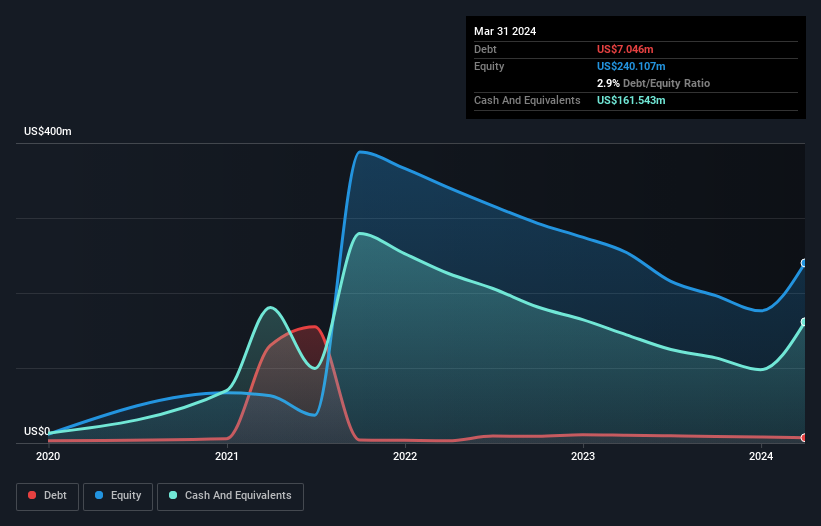The external fund manager backed by Berkshire Hathaway's Charlie Munger, Li Lu, makes no bones about it when he says 'The biggest investment risk is not the volatility of prices, but whether you will suffer a permanent loss of capital.' It's only natural to consider a company's balance sheet when you examine how risky it is, since debt is often involved when a business collapses. Importantly, Absci Corporation (NASDAQ:ABSI) does carry debt. But is this debt a concern to shareholders?
When Is Debt Dangerous?
Generally speaking, debt only becomes a real problem when a company can't easily pay it off, either by raising capital or with its own cash flow. In the worst case scenario, a company can go bankrupt if it cannot pay its creditors. However, a more usual (but still expensive) situation is where a company must dilute shareholders at a cheap share price simply to get debt under control. Of course, the upside of debt is that it often represents cheap capital, especially when it replaces dilution in a company with the ability to reinvest at high rates of return. When we think about a company's use of debt, we first look at cash and debt together.
View our latest analysis for Absci
What Is Absci's Debt?
The image below, which you can click on for greater detail, shows that Absci had debt of US$7.05m at the end of March 2024, a reduction from US$10.3m over a year. However, its balance sheet shows it holds US$161.5m in cash, so it actually has US$154.5m net cash.

How Healthy Is Absci's Balance Sheet?
Zooming in on the latest balance sheet data, we can see that Absci had liabilities of US$25.3m due within 12 months and liabilities of US$9.50m due beyond that. Offsetting these obligations, it had cash of US$161.5m as well as receivables valued at US$42.0k due within 12 months. So it actually has US$126.8m more liquid assets than total liabilities.
This surplus suggests that Absci is using debt in a way that is appears to be both safe and conservative. Because it has plenty of assets, it is unlikely to have trouble with its lenders. Simply put, the fact that Absci has more cash than debt is arguably a good indication that it can manage its debt safely. When analysing debt levels, the balance sheet is the obvious place to start. But ultimately the future profitability of the business will decide if Absci can strengthen its balance sheet over time. So if you want to see what the professionals think, you might find this free report on analyst profit forecasts to be interesting.
In the last year Absci had a loss before interest and tax, and actually shrunk its revenue by 14%, to US$5.3m. That's not what we would hope to see.
So How Risky Is Absci?
By their very nature companies that are losing money are more risky than those with a long history of profitability. And the fact is that over the last twelve months Absci lost money at the earnings before interest and tax (EBIT) line. And over the same period it saw negative free cash outflow of US$63m and booked a US$109m accounting loss. However, it has net cash of US$154.5m, so it has a bit of time before it will need more capital. Overall, its balance sheet doesn't seem overly risky, at the moment, but we're always cautious until we see the positive free cash flow. The balance sheet is clearly the area to focus on when you are analysing debt. But ultimately, every company can contain risks that exist outside of the balance sheet. Case in point: We've spotted 3 warning signs for Absci you should be aware of.
Of course, if you're the type of investor who prefers buying stocks without the burden of debt, then don't hesitate to discover our exclusive list of net cash growth stocks, today.
New: Manage All Your Stock Portfolios in One Place
We've created the ultimate portfolio companion for stock investors, and it's free.
• Connect an unlimited number of Portfolios and see your total in one currency
• Be alerted to new Warning Signs or Risks via email or mobile
• Track the Fair Value of your stocks
Have feedback on this article? Concerned about the content? Get in touch with us directly. Alternatively, email editorial-team (at) simplywallst.com.
This article by Simply Wall St is general in nature. We provide commentary based on historical data and analyst forecasts only using an unbiased methodology and our articles are not intended to be financial advice. It does not constitute a recommendation to buy or sell any stock, and does not take account of your objectives, or your financial situation. We aim to bring you long-term focused analysis driven by fundamental data. Note that our analysis may not factor in the latest price-sensitive company announcements or qualitative material. Simply Wall St has no position in any stocks mentioned.
Have feedback on this article? Concerned about the content? Get in touch with us directly. Alternatively, email editorial-team@simplywallst.com
About NasdaqGS:ABSI
Absci
Operates as a data-first generative artificial intelligence (AI) drug creation company in the United States.
Flawless balance sheet with slight risk.
Market Insights
Community Narratives




